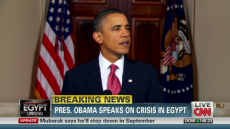
16+ age recommendation
Since the 1980s, there has been an explosive growth in both the amount and importance of satellite all-news broadcasting networks. The first of these channels to experience real success, and which came to set the “gold standard” for international broadcasting, was the Cable News Network (CNN). This network was for many years considered so important to foreign politics that the term ‘CNN effect’ emerged to describe the relationship between broadcasting and policymaking it had created. This article will explain what the CNN effect is and why it is important.
The term ‘CNN Effect’ originally referred to the fact that CNN was the only large TV-channel that covered as much as it did. Yet, during the 1991 Gulf War the meaning of the term shifted so that it is now generally understood as “…the process by which coverage of a foreign event by CNN causes the event to be a primary concern for its audience, which in turn forces the government to act.”. This implies that CNN affects the decision-making process of governments when it comes to foreign policy.
This power to set the agenda in global affairs is typically thought to be the largest implication of the CNN effect. As a political professor, McPhail, wrote: “In terms of foreign affairs, if it is not on CNN, it does not exist. It does not matter if it is the US Secretary of State, the British Minister of Foreign Affairs…if CNN does not pick up the story it disappears”. This perceived ability to completely control what is discussed by foreign offices is unprecedented and has an enormous implication, as those who are elected to determine foreign politics no longer have a say in which affairs they need to address. There is some debate, however, concerning the extent of CNN’s agenda setting power. Most agree that television broadcasting has somewhat changed the methodology of foreign politics, however, many believe that it is not because of CNN, the channel, but because of the way technology evolved. This means that it is now impossible to close your eyes to what is happening on the other side of the globe. Another argument says that the media is much more in the hands of governments than the CNN effect suggests. Supporters of this theory believe that CNN doesn’t affect the government but rather that they have been influenced by the government to show something in particular, that the government then seems to ‘react’ to, so the “CNN effect simply [is] a circle that begins and ends with government decision…”. However, here it is important to note that CNN is, or used to be at least, an independent entity; they film what they believe should be filmed, sometimes going against government wishes. Their coverage of the “Highway of Death” ( this was a nickname ascribed to a highway between Iraq and Kuwait which carried thousands of refugees during the 1991 Gulf War) for example, played a large role in ending the violence between American and Iraqi troops in 1991 Gulf War. Presumably, President Bush Sr. would not want to end the war on the basis of it being too horrible to continue, but on the basis of Americans having brought better conditions to the country. CNN’s coverage of this highway was clearly not planned by the government, yet had a major impact on their foreign politics.
The CNN has had large and pervasive implications for foreign policy. The CNN effect refers to the acquired power of broadcasting to set the agenda of foreign affairs to unprecedented extents. Although there is some debate about the degree of power it has, there are several cases, most notably the “Highway of Death” which imply that the CNN effect does in fact have a large amount of power over the global affairs agenda. Another implication of the CNN effect is its function as an accelerating factor; because of the constant flow of news, leaders and politicians may have to leave rationality behind, to a certain extent, in favour of quick decisions. The ‘CNN effect’ does not refer exclusively to the channel after which the phenomenon was named, but rather to the overall changes this channel has inspired – changes that have many large implications.
Image 1: http://edition.cnn.com/2011/POLITICS/02/01/us.egypt.obama/

0 Comment:
Be the first one to comment on this article.